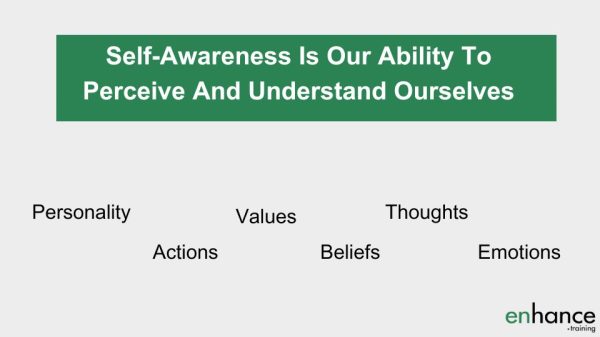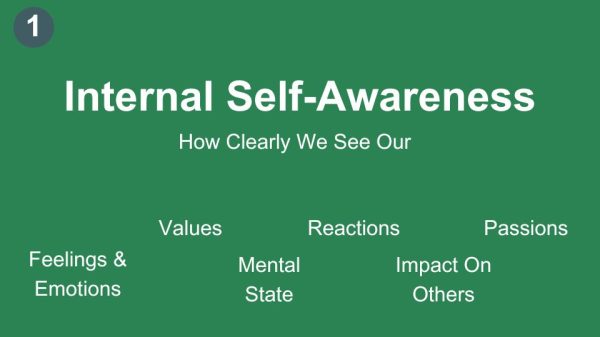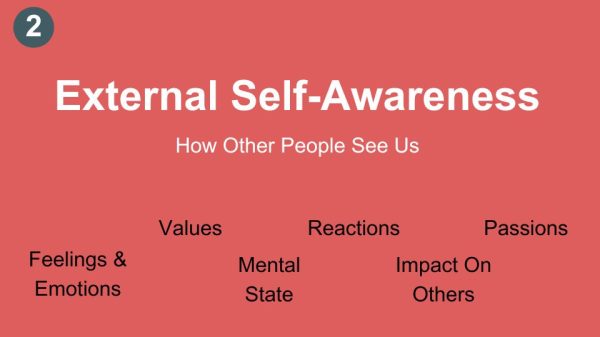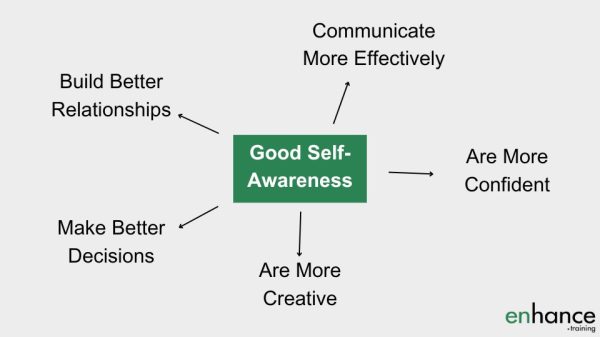Self-Awareness for Managers – 5 Actions to Improve Your Self Awareness

Self-awareness for managers is an essential skill to lead and manage others better. If you can’t manage yourself, then how will you manage others effectively?
Research suggests that when we have good self-awareness or see ourselves clearly, we build better relationships, communicate more effectively, are more confident, more creative and make better decisions. Those with good self-awareness are more likely to be open and honest.
Self-awareness gives us the ability to manage ourselves better, making us more effective leaders with happier team members, which in turn improves team performance, and creates more profitable companies.
Developing your self-awareness as a manager is really important to increase team performance and to improve your management skills as quickly as possible.
Self Awareness for Managers – 5 actions to improve your self-awareness
- What is self-awareness and the two types of self-awareness
- Why self-awareness is so important in leading and managing others
- 5 actions to improve your self-awareness

Watch on YouTube
Listen on Podcast
What is self-awareness and the two types of self-awareness
Self-awareness is your ability to perceive and understand what makes you an individual including your personality, actions, values, beliefs, emotions, and thoughts.
There are two types of self-awareness –
- internal or private self-awareness
- External or public self-awareness
Internal self-awareness is how clearly we see our feelings and emotions, our mental state, our values, our passions, our reactions and our impact on others. Research has found that better internal self-awareness is associated with higher job and relationship satisfaction, personal and social control, and happiness.
External self-awareness is our understanding of how other people view us in terms of the same factors as internal self-awareness. Those that are more aware of how others see them are better at showing empathy and understanding other people’s perspectives. For managers and leaders that see themselves as their team members do, their team members have better relationships with them, feel more satisfied with them and view them as more effective managers in general.
You probably expect that if you had good at internal self-awareness, you would have good external self-awareness. According to research done by Harvard Business Review, there is almost no correlation between them. You can be great at one and terrible at the other.

Why self-awareness is so important in leading and managing others
When leaders have developed the skills to manage themselves, their emotions, their fears, biases etc – they are much better equipped to manage others well.
Who would you have more confidence following – a leader that openly panics in a crisis, or a leader that calmly organises the team to take appropriate action? If the leader panics, what emotions will the team feel? When the leader is calm, they transfer their calmness to the team so better deal with the crisis.
Here are 6 very important benefits that increasing self-awareness at work brings:
1. Self-awareness helps you understand your own strengths and weaknesses
You can then use your strengths to support your team better and ask others to provide support to the team in your weaker areas.
2. Self-awareness gives you greater understanding of your impact on others
You are then able to make more thoughtful and considered decisions and take more careful actions. You are much more likely to keep your team happy and motivated, which further improves the teams’ ability to achieve goals.
3. Growing self-awareness enables you to better manage your emotions
You can then display your positive emotions to the team and manage and constructively communicate your negative emotions. You build authenticity and trust – and increase your effectiveness as a manager.

4. Improving your self-awareness helps build trust and credibility
You are much more likely to be authentic, fair and trustworthy and understand your mistake and limitations and be happy acknowledging them.
5. Better self-awareness improves decision making
When we understand our emotions and our biases, we are less likely to influenced by them during decision making.
6. Faster personal and professional growth
Self-aware managers are much more likely to seek out and take in honest feedback and change their management styles to fit the needs of the team they lead.
Six very good reasons to take steps to increase your self-awareness
How to increase your self-awareness
Studies indicate that although most people believe they are self-aware, only 10-15% are truly self-aware. The first of 5 useful actions to help improve your self-awareness as a manager is
1. Actively seek and use feedback given
Feedback is an essential tool to assess how well we are doing so we can either do more of the same or work out how we can improve the decisions and actions we take.
The more senior your position, the more power you hold over employees’ careers and therefore the harder it is to get candid honest feedback. 5 ways that I have found to be very useful in developing self-awareness include:
- Regularly ask colleagues, peers, and your boss’s for feedback. Always listen, control your reactions, and thank them for providing feedback. You aim is to encourage as much honesty as possible.
- Organise 360 degree anonymous feedback questionnaires using third party providers. You want employees to be confident they can tell the truth without repercussions.
- Take as many personality tests and preferences tests as possible. Each will give you a different viewpoint or angle on yourself which can provide good insights to increase self-awareness for managers.
- Make the time to reflect on your emotions, thoughts, biases etc. in as many situations you encounter as possible.
- Get a coach or mentor. Both are great for getting personalised, considered, and honest feedback.
Feedback is incredibly important – get as much as you can for increasing self-awareness to manage others better.
2. When improving your self-awareness ask What instead of Why
It is widely assumed that reflecting on your thoughts, feelings and behaviours will lead to greater self-awareness. Research shows that this is often not the case. How you reflect on your thoughts and emotions is important and many do this incorrectly.
Research has shown we don’t have access to many of our unconscious thoughts, feelings, and motives. Asking “Why did I get angry with Dave and shout at him?” may not give you the answers that will enable you to change your behaviour for next time. Asking why in negative situations invites us to criticise ourselves and beat ourselves up.
Much better is ask yourself a what question. i.e. “What can I do the next time I get angry with Dave to ensure I don’t shout at him?” What questions help us stay objective, focused on creating future solutions and help empower us to take action on our insights.
Ask what instead of why when reflecting on how to improve your self-awareness.
3. To improve your self-awareness, understand your values
Understanding your values as a manager or leader, in my view, is very important for several reasons.
- When you make decisions and take actions in line with your values, you are likely to be perceived as a lot more authentic, trustworthy, and predictable. All important in increasing team performance
- Your values rarely change quickly, so using your values as a stable reference point, enables you to be more consistent in your decisions, actions, and behaviours, which in turn improve expectations setting and the team’s feeling of safety.
- When you act and behave in line with your values, you are showing more of who you are in an honest and open way. This builds trust in you personally and it encourages the team to adopt those values, influencing how the team acts and behaves.
Use your values to manage in an authentic honest way. Take actions for becoming more self-aware of your values.
4. To improve your self-awareness learn your strengths and weaknesses
You are going to be a lot more effective as a manager when you use your strengths to help the team achieve their goals and let others use their strengths when then have stronger skills than your weaker areas.
A manager or leader will not be good at everything. Great managers and leaders know what they are good at and when to leave others better than them to do a task or activity.
With good self-awareness of your own strengths and weaknesses, and your teams’ – you can play to every team member’s strengths as much as possible. This is a great example of leveraging the team’s skills to achieve more.
With good self-awareness you are much more likely to openly acknowledge your weaknesses, which will inspire confidence and trust with team members and in turn provide confidence for your team members to do the same. Better knowledge of team member’s strengths and weaknesses will help you leverage team efforts even better, further increasing team performance.
5. To Improve your self-awareness learn what drives strong emotions
Displaying your positive emotions as a manager such as happiness, excitement and motivation and downplaying negative emotions such as anger, frustration and uncertainty make a big difference to the team’s confidence in you and your credibility as a manager.
Your emotions and behaviours create a significant influence on the team. Team members watch what you do and how you behave and emulate that themselves. If you are calm and considered, your team will be too. If you are nervous and unsure, your team will be too.
Pay attention to what triggers strong emotion in you, especially your negative emotions. For instance, what really annoys you? What behaviour in others makes you angry? What makes you frustrated?
With improved self-awareness, you can work on and use different techniques to constructively show your negative emotions or minimise your visible reaction to them. For example, when I am angry, I don’t rant and rave, but I will tell team members that I am really angry. Labelling negative emotions and reactions is a good way of constructively communicating feelings while demonstrating control over them.
Paying attention to what triggers strong emotion in you is a great way to increase your self-awareness.
in summary
Improving your self-awareness will help you be a much better leader and manager. Self-awareness for managers is vital to enable them to effectively manage others, so please use all the actions and tips to improve your self-awareness.
To recap we have been through:
- What is self-awareness and the two types of self-awareness
- Why self-awareness is so important in leading and managing others
- 5 Actions to improve your self-awareness for mangers
If you have any questions on “Self Awareness for Managers – 5 actions to improve your self-awareness” please email me at support@enhance.training and I will get back to you.
Thanks very much for watching and I look forward to speaking to you again soon,
Being self-aware is incredibly valuable for a manager of others. If you are not aware of yourself, you emotions, your biases, what influences etc, then managing yourself is a lot harder. You lose a lot of credibility and respect as a manager if you are not good at managing yourself. People expect self-management.
If you are not good at managing yourself, how will you be good at managing others?
Any time invested in building your own self-awareness is valuable!
Jess







